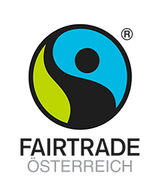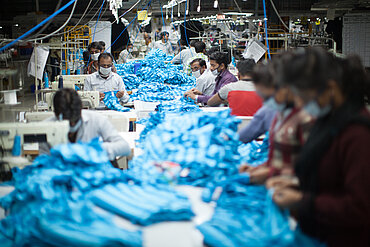von FAIRTRADE Österreich
Living income must be included in the EU CSDDD
Workers producing clothing at the Pratibha factory, India.
We, the undersigned Civil Society Organisations (CSOs) and producer organisations, call on you to include living income and fair purchasing practices within the EU Corporate Sustainability Due Diligence Directive (CSDDD) as included in the position of the European Parliament.
We welcome the CSDDD and its goal to address the human rights and environmental impacts of companies' global value chains. However, in order for it to lead to positive change, it must take into account the interests and needs of rightsholders, especially those in the most vulnerable position in global value chains. Smallholders and Indigenous Peoples and local communities (IPLCs) are some of the most marginalised actors in global supply chains. Yet these people are essential for feeding the global population and sustaining precious natural ecosystems. Smallholders produce a third of the world’s food supply, while approximately one-quarter of global forests, or 1 billion hectares, are estimated to be managed by IPLCs.
The importance of small-scale food producers – particularly women, Indigenous Peoples, family farmers and pastoralists – is explicitly recognised in SDG Target 2.3. These rightsholders form the backbone of the economy in many countries and often rely on export-related incomes to meet their basic needs, with limited options for alternative income. Their dependence on large operators that buy their products makes them particularly vulnerable to low prices (which sometimes do not even cover the costs of production) and unfair purchasing practices. This adds to the instability of their communities’ livelihoods and overall well-being.
The lack of a decent standard of living is often combined with other human rights violations such as discrimination and land grabbing – e.g., Indigenous Peoples are nearly three times as likely to be living in extreme poverty as their non-indigenous counterparts. Even when in wage and salaried work, Indigenous Peoples earn on average 18 per cent less than their nonindigenous counterparts. Poverty also has direct environmental impacts: smallholders may encroach into forests and degrade their environment as an attempt to secure the short-term subsistence of their families – while directly suffering from the consequences in the long term.
September 2023 1 It is crucial that the CSDDD addresses the root causes of harm faced by these people, including unfair purchasing practices and lack of living income. In this regard, we welcome the explicit reference to living wages and a decent standard of living as a human right in Part I A of the Annex of the Commission’s proposal, as well within the Council’s General Approach and the Parliament’s position. However, unless a specific reference to living income is included as well, non-wage workers such as smallholders or selfemployed workers will not benefit from that provision.
While a wage is the payment a worker receives from their employer for a particular amount of time worked, an income is earned by an independent worker through the sale of their goods or services and is often composed of different sources. In the agricultural sector, that might include the net income earned from the sales of crops and any food that is produced and consumed at home, as well as additional income earned separately by the family farm to supplement the farm income. Both living wage and living income are essential for combating poverty.
The European Parliament included a reference to living incomes in its position (Part I of the Annex, subheading 1, point 7). According to the Parliament, the right to enjoy just and favourable conditions of work, including remuneration that provides for a decent living, “includes both the right to a living wage for employees and the right to a living income for self-employed workers and smallholders.” This addition is grounded in the authoritative interpretation of General Comment No. 23 (2016) on the Right to just and favourable conditions of work (article 7 of the International Covenant on Economic, Social and Cultural Rights), which clarifies that the right to enjoy just and favourable conditions of work includes self-employed workers. It is also aligned with companies’ demands, in particular in the cocoa sector.
The European Parliament also underscores the need for companies to address their purchasing practices as part of the due diligence process, by including this obligation throughout articles 5-8, beyond a simple reference in recitals. As highlighted by several CSOs and companies, if companies are not required to adopt responsible purchasing practices, the right to living income and living wage is unlikely to materialise.
Therefore, we urge you to align with the European Parliament on these elements, by including an explicit reference to living income alongside living wage in the annex and referencing purchasing practices in the operative articles of the CSDDD. This way, you will enable millions of vulnerable rightsholders like small farmers and IPLCs to harness the potential of the CSDDD and to truly benefit from it.
Signatories
1. Appui pour la Protection de l'Environnement et le Développement
2. Commerce Equitable France
3. Coojepawoscoops
4. Coopérative Agricole Régionale de L'Agnéby-Tiassa (COOPARA-SCOOPS)
5. Coopérative Agricole de la Marahoue, succursale de Daloa
6. Coopérative Agricole des Frères Unis de la Marahoue
7. Coopérative Agricole Djidjiya de Blolequin, succursale d’Issia
8. Coopérative Agricole Eyo Enian de Nouveau
9. Coopérative Agricole Gbadrikro de Gôdêyaokro (CAGG)
10. Ecosystèmes et Développement
11. El Puente
12. Entreprise Coopérative de Saint Paul
13. Fair Trade Advocacy Office
14. Fairtrade Africa
15. Fairtrade International
16. Fairtrade Network of Asia Pacific Producers.
17. FEMNET
18. Fern
19. Focus, Association for Sustainable Development
20. Forest Peoples Programme
21. Forest Watch Indonesia
22. Forum Fairer Handel
23. Fundación Libera contra la Trata de Personas y la Esclavitud en todas sus Formas
24. GEPA - The Fair Trade Company
25. GREEN FOREST AFRICA
26. Indonesia for Global Justice (IGJ)
27. Initiatives pour le Développement communautaire et la conservation de la forêt (IDEF)
28. INKOTA netzwerk
29. JPIC Kalimantan
30. Lingkaran Advokasi dan Riset Borneo
31. Mighty Earth
32. Organisation de la Société Civile Ivoirienne et Internationale (OSC2i)
33. Ovibashi Karmi Unnayan Program (OKUP)
34. Oxfam
35. Rainforest Alliance
36. Repórter Brasil
37. Réseau des Organisations de la Société Civile pour le Développement du Tonkpi (ROSCIDET)
38. RISOME
39. Satya Bumi
40. SchokoFair – Stoppt Kinderarbeit!
41. Société Coopérative Agricole du Haut Sassandra (SCOAKHS)
42. Société Coopérative Agricole Allah Kabo
43. Société Coopérative Agricole Bekelema des producteurs d’Issia
44. Société Coopérative Agricole Binkadi de Divo
45. Société Coopérative Agricole Guelanin de Bangolo
46. Société Coopérative Agricole Here de Zagne
47. Société Coopérative Agricole Kiswensida Cochme-Dida
48. Société Cooperative Agricole Lanaya de Vavoua
49. Société Coopérative Agricole Sabougnouman de Boubo avec conseil d'administration
50. Société Coopérative Agricole simplifiée DFA de Divo
51. Société Coopérative Agricole simplifiee Sama du Haut Sassandra
52. Société Coopérative Agricole Solidarité de Béoué (SCASB COOP CA)
53. Société Coopérative Agricole Yehoulo-Yehon de Mafere
54. Société Coopérative Agricole Zapoto de Dairo
55. Société Coopérative Agricole des Producteurs de Café Cacao de Yamoussoukro avec conseil d’administration
56. Société Coopérative avec conseil d'adminstration Laafi de Guiglo
57. Société Coopérative avec conseil d'adminstration de Diangobo (COOP-CA.ADI)
58. Société Coopérative des agriculteurs de Didoko
59. Société Coopérative des Agriculteurs Solidaires de Duekoue
60. Societé Coopérative des Exploitants Agricoles des Antilopes du Haut-Sassandra
61. Société Coopérative pour le développement de l'agriculture de Yamoussoukro
62. Société Coopérative simplifiée agricole des producteurs de Gueya-Blolequin (SCOOPS SCOPG)
63. Solidaridad
64. SÜDWIND Institut
65. Tropenbos International
66. Tropical Forest and Rural Development
67. Wahana Lingkungan Hidup Indonesia Eksekutif Daerah Jambi (WALHI Jambi)
68. Weltladen-Dachverband
69. World cocoa farmers organization (WCFO)
70. World Fair Trade Organization - Europe
Weiterführende Informationen


